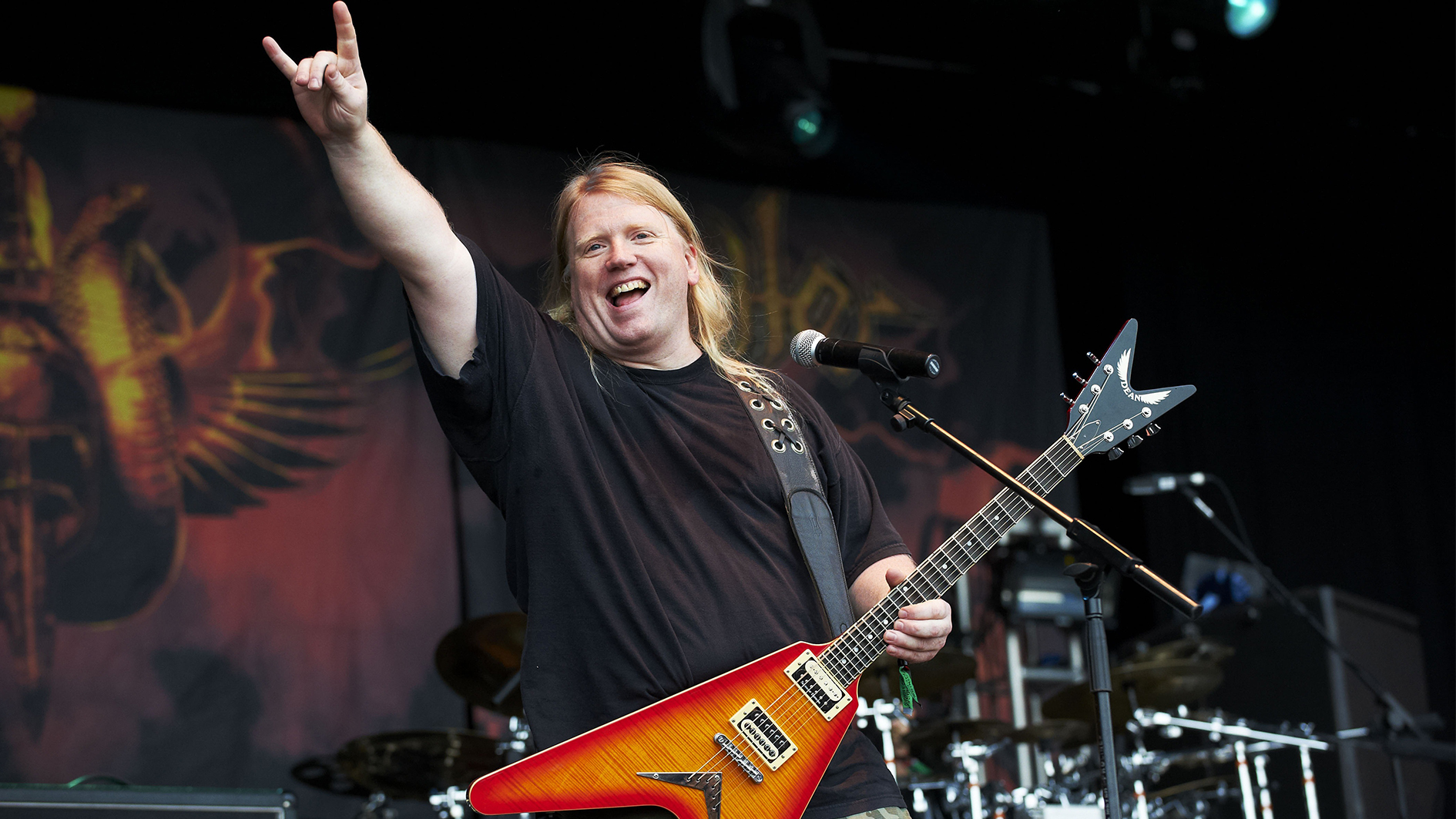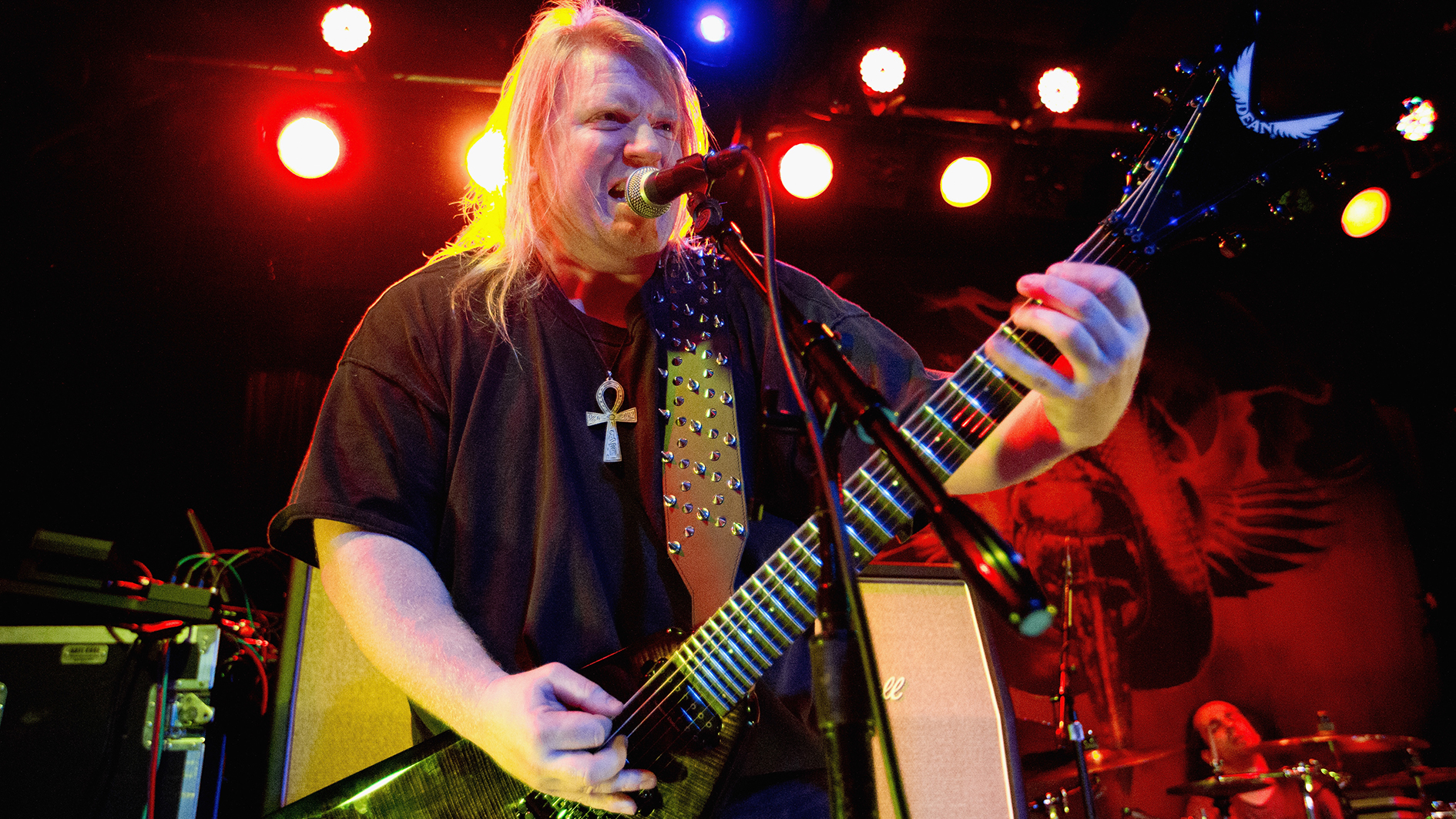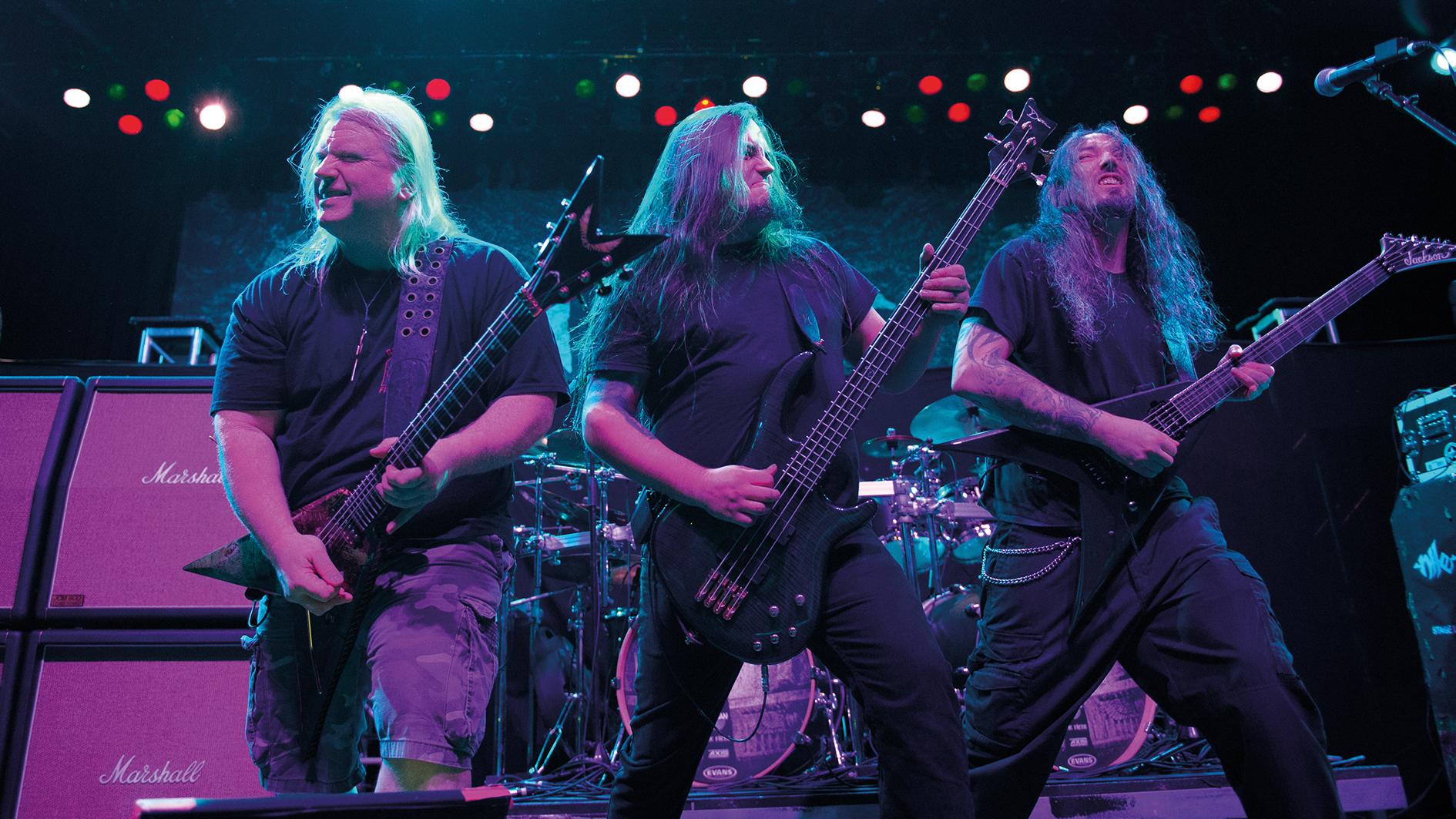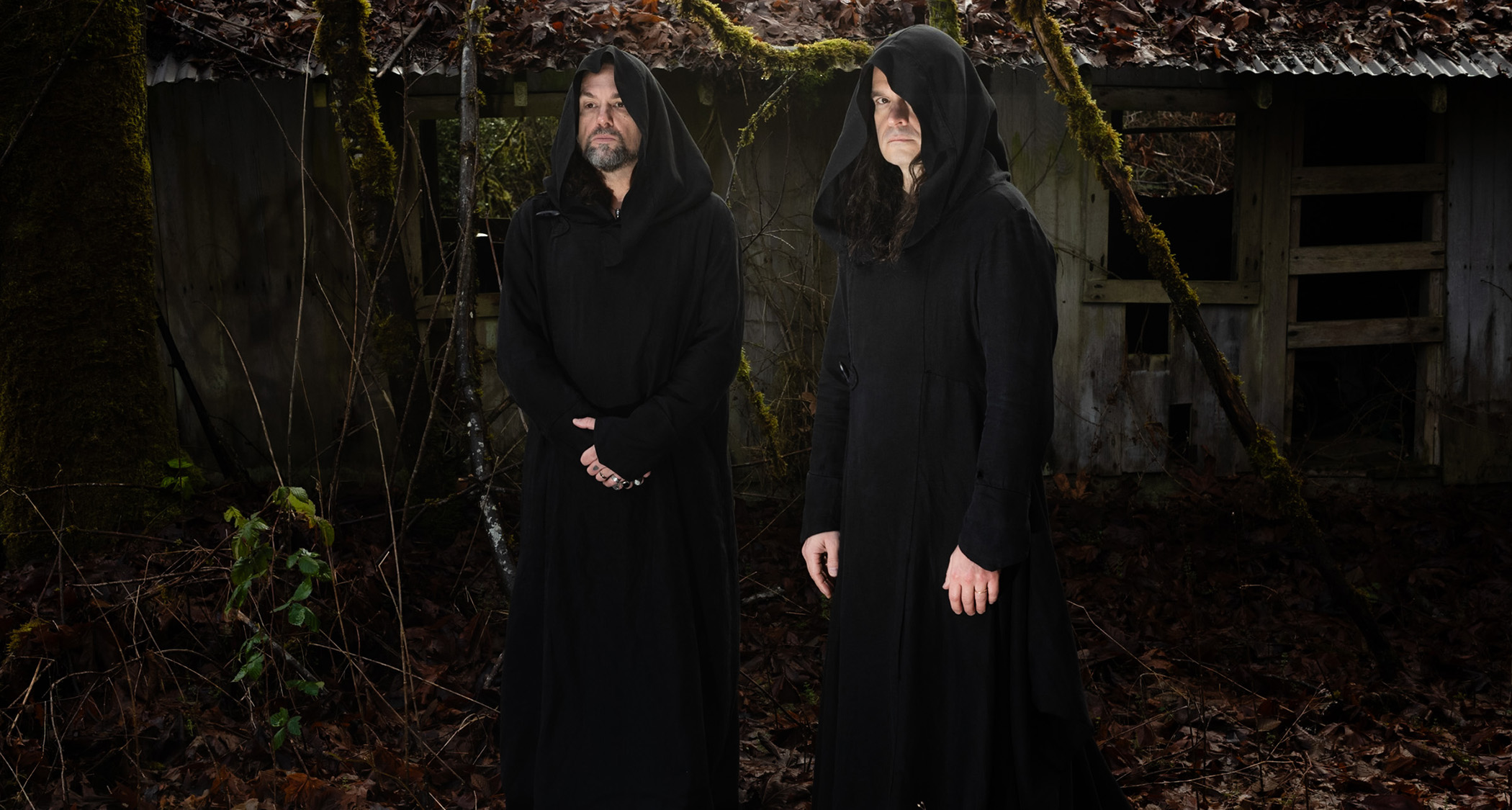Nile’s Karl Sanders talks new guitar partnerships, the key to heaviness and what all tech-metal bands can learn from The Beatles
Sanders has composed some of death-metal’s most pulverizing arrangements, but “people go ridiculously nuts over” his most simple songs

Nile’s death-metal sound can make you feel like surfing. There is that moment where you fear you might die, drowned under the wash of blast beats and disorientating hyper-picked rhythm lines with the electric guitar all but speaking in tongues.
This mortal panic only intensifying as the song builds towards something, a chorus maybe, or the bridge. Just before you lose your breath, the wave breaks. You’re OK.
Right there, that’s where Nile’s guitarist/vocalist Karl Sanders has put the hook, and, typically, it is massive, sweeping you along with its power. As with surfing, it’s as though you have cheated death. And you never feel more alive than having just cheated death.
Karl Sanders is chuckling. This pleases him not because he is a surfer but because the hooks, that human connection, is something that he engineers into the song. The songwriting fundamentals are working. Also, well, he just loves Dick Dale.
“Right on! Well, I am a fan of surf music as well,” says Sanders. “Dick Dale? Wow! What a guy. That’s actually something that we’ll goof around with at soundcheck sometimes, playing surf music. [Laughs]”
If Sanders is famous for having created Nile’s thematic concerns of death and arcane magic out of Ancient Egyptian mythology and history, he is similarly animated by an interest in the history of music of all genres.
When asked about where those extravagant turnarounds come from, those passages that see Nile transition from one brutal tech-precise rhythm part to another, that execute a feel change or signpost an incoming hook, and he says this goes back to the trailblazers of electric guitar.
All the latest guitar news, interviews, lessons, reviews, deals and more, direct to your inbox!
The funny thing is is that the simpler songs are the ones that people go ridiculously nuts over
“The blues and the jazz chord progressions, the motifs, the turnarounds, the heads, that’s all from studying early stuff like Cream, Eric Clapton, early Jeff Beck,” he explains.
“Wow! Jeff Beck! What a fucking incredible guitarist! Oh my god! Dude, Jeff Beck.” We might not find much of the Yardbirds or Cream on initial spins of Nile’s ninth studio album, Vile Nilotic Rites, but Sanders assures us that it’s all in there by osmosis.
Vile Nilotic Rites marks a changing of the guard in the South Carolina DM kingpins. Dallas Toler-Wade, a stalwart since ’97, left the band a couple of years ago, with Brian Kingsland stepping in.
Kingsland, says Sanders, is “a breath of fresh air,” a former guitar teacher whose comprehensive grasp of theory allows him to augment Nile’s sound with ever-more outré chord substitutions, and a hybrid-picked style that puts a fresh spin on death metal lead guitar.
As Sanders tells it, both he and Kingsland are Lennon/McCartney aficionados, and songwriting principles mastered by the Beatles translate into any genre. Sure, you can listen to death metal 24/7, and you’ll be all good for death metal, but in Sanders’ thinking, there’s too much to explore, too many lessons to be learned.
I always write the words first, and that way I am never lost. [That way] I always have, like, a road map or a guide.
Maybe that’s why Nile sound the way they do.
But maybe it’s also because Sanders appreciates that, in amongst the tech-forward blitzkrieg, there has got to be something simple. The wave has got to break. Sanders laughs.
“The funny thing is is that the simpler songs are the ones that people go ridiculously nuts over,” he says. “It’s crazy how it works. One day I would like to play some music that is simple. Like, maybe not necessarily simple, but not built upon insane wrist-breaking guitar parts. Something that’s... Playable!”
From the outside, Nile’s arrangements are so intimidating. What is the writing process like?
“I always write the words first, and that way I am never lost. [That way] I always have, like, a road map or a guide. Because the music is based off the words it takes me to places I wouldn’t have chosen if I was just doing it in a standard way of, ‘Hey, I’ll pick up the guitar, and here are some riffs, and I’ll stick some words on it.’
"No, I put these songs together with purpose and for better or worse it goes somewhere. It may not go from A to B. It might go from A to R. But at least we went somewhere. As long as you arrive somewhere, with something interesting for the listener, then that is all that matters.”
Amidst the maelstrom of blasts and the craziness, you resolve it in a riff or something innately human. Is that something you look out for, that place to put the hooks?
“Yeah. You really know when you go through the process of writing and recording it which ones are going to connect for you and which ones are going to connect for the listener. You can see it in your mind.
"I remember back when I was writing Black Seeds of Vengeance, and I got to that end vamp with the chorus, with the title over and over - ‘Black seeds of vengeance!’ - and I could see in my mind the audience going along with it.
"When your brain can picture it that vividly, you are really just bringing it to life. It’s like you are plucking it out of the air and making the intangible tangible.”
There’s power in repetition. The same mechanism that can make a song such as She Loves You by The Beatles function, also works with Black Seeds of Vengeance, with death metal.
“It’s funny that you mention Lennon and McCartney because both Brian and I are huge Beatles fans. This record has got Beatles songwriting lessons crawling all over it.
"Man, the lessons that can be learned from just studying the work of Lennon and McCartney! Even if you are playing tech death metal, whatever, songwriting fucking matters. Knowing how to take those musical elements and use them to tell a musical story is not something that just falls out of the fucking sky.
"There is a lot of craft that goes into that, and, definitely, Brian is on the same page with me on this; study the work of the masters. It’s where all the great lessons are.”
Sometimes the lesson is that we can create so much out of so little.
“Yeah, I totally agree. Sometimes that stark simplicity is beautiful in itself. There is a version of a song, wait, I’m trying to think of it, it’s an old Lou Reed song, Sweet Jane, and somebody came out with that 15 years ago and it’s just a simple acoustic guitar, with a lot of ambience on it, and one layer of vocal, and there is not a whole lot else to it, and it’s the most beautiful, haunting thing I think I have ever heard.”
And look at early Celtic Frost, simple arrangements and yet that vibe is almost impossible to recreate.
“Well, there you go. Exactly! I happen to be a fan of early Celtic Frost. Even though those are simple songs, with simple guitar parts, they are incredibly heavy.
"Sometimes the riffs, the ideas that are simpler, make a more direct connection and you can allow it to have that weight. Heaviness, doom, it’s a very elusive quality. If you get too tricky with it you lose that feeling of doom very quickly. It’s fleeting. It will run away, like a deer!
"So yeah, the simple riffs, man, they fucking matter. Interspersed with all the new craziness on this new Nile record are plenty of slow riffs, plenty of them.”

We might have been laughing earlier, but Dick Dale helped popularize tremolo picking and there’s not a world of difference between applying his technique to play Miserlou and, say, Cause of Death.
“Y’know, you’re absolutely right. It’s part of the same lineage. It’s where it descends from, the tremolo-picked melody. It goes even further back than surf music.
"I mean, way back before electric instruments, right; if you had a stringed instrument and you needed the note to have continued sustain, and you are playing a slow melody but it needs to stay forceful. There are all kinds of tremolo styles, like flamenco guys.
There are guys I know playing death metal that have no idea what it is they are fucking playing and they are making music.
"Of course, they are using their fingers - they are not using a pick - but it’s the same musical concept where you are rhythmically dividing a melody up and you are picking the 16ths and 32nds with it and achieving a sustained melody through the emphatic repetition. It’s an old concept.”
Do you think that it is important for anyone who wants to play death metal to go back and learn as many styles as they can?
“Well, is that necessary, though? On the one hand, we could make the argument that having studied it, it deepens our knowledge and understanding of what we are doing, but I think the guitar is inherently something that you don’t have to know what you are doing. [Celtic Frost frontman] Tom Warrior doesn’t have a fucking clue what he is doing on the guitar, but he makes incredible music!
"The two things are not necessarily tied together. There are guys I know playing death metal that have no idea what it is they are fucking playing and they are making music. So, is it necessary? No.”
But you are looking for more, digging deeper...
“I listen to a lot of different types of music. I think that’s kind of evident in the music of Nile. It’s not strictly written as someone who only listens to Cannibal Corpse and Suffocation, right. When you listen to Nile you hear a whole lot of other stuff in there. But it’s not necessarily necessary.
"I think what comes out is what is put in. In other words, if all you listen to is death metal, well I am sure you will be able to play death metal just fine. In fact, I know lots of guys like that, but I like a whole lot of stuff.
“[But] it’s not going to musically satisfy me if it only has one influence. There is a whole universe of stuff out there and there is a lot to enjoy. In fact, there is so much fucking music and so much about guitar that you can’t learn it all in one fucking lifetime. The more you learn, the more you learn that you know nothing!”
That is the paradox of wisdom! We only attain it when we realize how much we don’t know.
“This really hit home to me a few years back. I had been playing the guitar for a lot of years already and I started buying up some instructional videos from this guy named Rusty Cooley.
"I really liked the stuff he was doing. I thought it was amazing. So I got his videos. I had mentioned him online, and someone told me, ‘Hey, Rusty is a fan of yours! He drives around in his Humvee listening to Annihilation of the Wicked.’ Like, ‘Holy-fuckin’-shit!’
"So I got in touch with him and over the years we have become good friends, but here’s where the story really hits. I thought I knew how to fucking play guitar. Right? I’m making a living playing guitar. I am playing guitar all fucking day long, practicing my ass off all the time, but when I sit down with Rusty Cooley I feel like I know nothing!"
There is always that player who will knock you on your backside and make you think again.
“Yeah! I really believe in staying humble: learns as much as you can and practice as hard as you can... Especially now, in the age of YouTube. We players have access to so much information; we can actually see how the greats are doing things.
"If you want to see how Steve Vai did something, you just fucking YouTube search it and watch Steve Vai play, and that’s how it’s done. Dude, when I started playing we didn’t have that fucking level of information. The guitar was like voodoo science. You had to search it out and you had to dig it out.”
Tells us a bit more about Brian. How is the dynamic between you shaping up?
“I really liked the freshness of what Brian was doing as a guitar player. He plays a lot of ideas that aren’t necessarily metal ideas but he puts them into a metal context. Like he does these complicated arpeggio sequences with a pick and three fingers that you wouldn’t necessarily find in a metal context.
“He’s playing minor seventh flat five arpeggios (m7b5), and since he is not just using his pick, and he is also using his fingers, the voicings all change, and the notes are all in a different order.
"It all sounds smooth and easy when you hear it because he makes it sound easy, but what he is actually doing is very fresh. Some of the chord voicings in the stuff he wrote on this record was like, ‘Oh my god!’ That’s genius!’ He has got a style that is completely different to mine and yet he understands exactly what Nile is doing. I am really fucking happy with this guitar team.”

And finally, what gear were you using on this?
“I’m playing Dean guitars. There was a Jackson. I also used my Jackson USA King V with the [In Their] Darkened Shrines graphic. It got used quite a bit on this record. Let’s see, what else?
"Marshall amps. I’m using the new Marshall DSL100 heads. Man! This is a pretty good version of the Marshall thing, I gotta tell you. These heads have a lot of bite, a lot of clarity, a lot of just Grrraaaaarrrrgh! I don’t know if you can print that, Grrraaaaarrrrgh!”
We can do that. The DSLs have a lot of gain. But did you run any additional gain pedals in front of your amp?
“Just one one gain pedal for the rhythm tone and it was the Radial Plexi. It’s kind of an old pedal but it’s pretty fucking good and it gives you a lot of options for dialing in the exact tone that you need. The Hot Plexi [Tonebone Hot British] I think it’s called.”
Nice. That just hits the front of the amp a little harder.
“That’s all you need. The Marshall itself has plenty of gain so you don’t necessarily need to go crazy with the pedal in front.
"I think the important thing is: A) you’re giving it another tube stage, but B) there is a natural low-cut that’s built into this thing that cuts everything below 80Hz, and that helps tighten up the bottom-end of your sound. Instead of the tone coming out of your amp like flubby and loose; cutting out all that shit below 80Hz really helps the translation of what’s going on.”
Jonathan Horsley has been writing about guitars since 2005, playing them since 1990, and regularly contributes to publications including Guitar World, MusicRadar and Total Guitar. He uses Jazz III nylon picks, 10s during the week, 9s at the weekend, and shamefully still struggles with rhythm figure one of Van Halen’s Panama.

